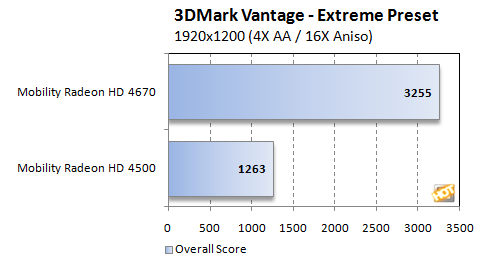ATI Mobility Radeon HD 4000 Series Preview
HOW WE CONFIGURED THE TEST SYSTEM: We tested the graphics cards in this article on an Gigabyte GA-EX58 Extreme motherboard powered by a Core i7 920 quad-core processor and 6GB of OCZ DDR3 RAM. The first thing we did when configuring these test system was enter the system BIOS and set all values to their "optimized" or "high performance" default settings. Then we manually configured the memory timings and disabled any integrated peripherals that wouldn't be put to use. The hard drive was then formatted, and Windows Vista Ultimate SP1 was installed. When the installation was complete we fully updated the OS, and installed the latest DX10 redist and various hotfixes, along with the necessary drivers and applications.
|
|
|
|
Gigabyte EX58-Extreme Mobility Radeon HD 4670 512MB Integrated Audio |
Relevant Software: Windows Vista Ultimate SP1 DirectX March 2009 Redist ATI Catalyst v8.561 beta |
|
|
|
|
|
The latest version of Futuremark's synthetic 3D gaming benchmark, 3DMark Vantage, is specifically bound to Windows Vista-based systems because it uses some advanced visual technologies that are only available with DirectX 10, which y isn't available on previous versions of Windows. 3DMark Vantage isn't simply a port of 3DMark06 to DirectX 10 though. With this latest version of the benchmark, Futuremark has incorporated two new graphics tests, two new CPU tests, several new feature tests, in addition to support for the latest PC hardware. We tested the graphics cards here with 3DMark Vantage's Performance preset option, which uses a resolution of 1280x1024 no anti-aliasing and trilinear filtering. |


Obviously the Mobility Radeon HD 4670's 320 stream processors, larger frame buffer, and wider memory interface allow it to significantly outpace the Mobility Radeon HD 4500 series offering in 3DMark Vantage.
|
|
|
|
|
Left 4 Dead is a co-operative, survival horror, first-person shooter that was developed by Turtle Rock Studios, which was purchased by Valve part-way into development. Like Half Life 2, the game uses the Source engine, however, the visual in L4D are far superior to anything seen in the Half Life universe to date. The game pits four Survivors of an apocalyptic pandemic against hordes of aggressive zombies. We tested the game at resolutions of 1280 x 720 and 1680 x 1050 with 4x anti-aliasing and 16x anisotropic filtering enabled and all in game graphical options set to their maximum values. |

In out custom Left 4 Dead benchmark, the Mobility Radeon HD 4670 is again easily able to outperform the 4500 series GPU. It is worth noting, however, that we tested with all of the in-game graphics options cranked up to the maximum values, with anti-aliasing and aniso filtering enabled. Should the Mobility Radeon HD 4500 series find its way into some attractive thin and light notebooks, it would definitely be able to run L4D at acceptable framerates with the image quality settings turned down a bit.









